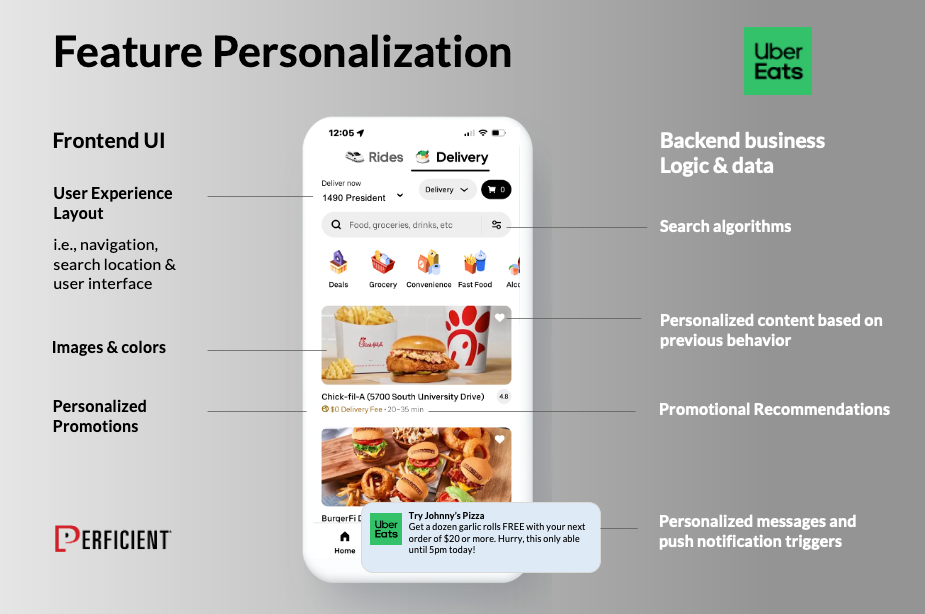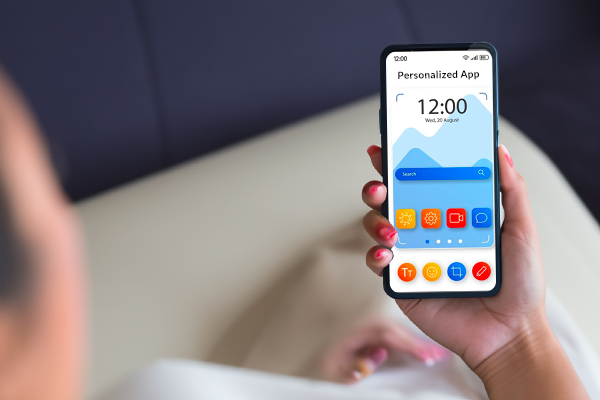Fresh from the latest experimentation and personalization conferences, it’s evident that while artificial intelligence (AI) is the top trend, personalization remains a pivotal factor in your website and native mobile app. Surprisingly, many companies still underutilize this powerful tool. They may experiment with geo-targeting and content tweaks but struggle to see the direct impact on their personalization results. But here’s where the game-changer lies—it’s called feature personalization.
Think about your favorite mobile apps—banking, shopping, or social media. They seem to know you inside out, offering features and value-added products that resonate with your profile. This is the magic of feature personalization, and it’s what we’ve come to expect from the likes of Amazon’s personalized shopping recommendations and Netflix’s content suggestions based on our viewing history.
Feature Personalization is a Game-Changer
It’s a vital tool that the fastest-growing companies are leveraging to scale their KPIs and enhance the customer experience.
Elevate your growth through personalization, making sure it becomes the driving force behind your digital success. Connect with Perficient today to get a complimentary assessment of your feature personalization program!
At its core, feature personalization revolves around tailoring the features and content of your website or application to individual users. This process takes into account various factors, including user preferences, behavior, and data. It’s a versatile approach with numerous applications, each specific to the industry your business operates in. Here are a few industry-specific examples:

How Uber Eats Uses Feature Personalization in their Native App
- Personalized notifications: Send push notifications based on user behavior and preferences, such as alerts for upcoming discounts or new features.
- Contextual search: Use context, such as location or time of day, to provide more relevant restaurant search results.
- Personalized in-app guidance: Provide tailored guidance based on user progress or milestones, such as services, to save time or money.
- Customized UI elements: Use user data to show relevant UI elements, such as a savings tracker or a food preferences view.
When it comes to financial services, here are some examples of personalized features:
- Upsells for additional services, such as showing different credit card offers based on spending habits and credit scores.
- Personalized portfolios for stock trading apps, providing different charts, news, and analyses to investors based on their portfolio and risk tolerance.
- Financial planning apps recommend budgeting strategies and financial products based on income, expenses, and financial goals.
Some examples of feature personalization on a commerce website and apps are:
- Quick checkout personalization for repeat B2B customers.
- Tailored offers and discounts are based on a user’s previous purchases, location, and demographics.
- Personalized shipping options consider a user’s location, past shipping choices, and order history.
- Personalized push notifications based on user interests and purchase history.
What’s The Point Using Feature Personalization?
The goal of feature personalization is clear: to enhance user engagement, improve conversion rates, and ultimately drive better results in digital marketing efforts. It’s a powerful strategy that aligns with your expertise in digital transformation consulting.
The fastest-growing companies have mastered the art of feature personalization because they understand its impact on KPIs and the overall customer experience. By tailoring their digital products and marketing efforts to meet the unique needs and preferences of individual users, these companies have managed to scale their businesses and create more satisfied and loyal customers.
What kind of outcomes can you anticipate from embracing feature personalization?
- Increased Engagement and Retention: Personalized experiences lead to higher user engagement and increased loyalty to your brand.
- Improved Customer Experience: Personalized features facilitate the achievement of customer goals, resulting in higher satisfaction and loyalty.
- Precision in Marketing and Promotions: Personalized data enables companies to target marketing and promotions more effectively, leading to higher conversion rates.
- Revenue Growth: All of the above factors ultimately contribute to increased revenue and profitability for product or service companies.
While the exact impact of personalization can vary, research indicates its significant potential. Personalized recommendations can increase conversion rates by up to 30%, personalized push notifications can boost engagement by up to 50%, and 72% of app developers report increased revenue after implementing personalization.
Taking it a step further, feature personalization aligns perfectly with the concept of continuous improvement. To accelerate your results, consider techniques like progressive delivery and continuous deployment. These approaches allow you to introduce small changes to your product in near-real-time, gather feedback, and make improvements rapidly. The goal is to establish a culture of experimentation and data-driven decision-making where constant refinement and optimization based on user feedback become the norm.
AI plays a pivotal role in powering feature personalization.
Here are some ways AI can be harnessed:
- Natural Language Processing (NLP): Analyzing customer feedback and support tickets to identify common issues and suggest personalized solutions.
- Machine Learning Algorithms: Analyzing customer data and usage patterns to identify behavior patterns and predict actions, informing personalized feature recommendations.
- Reinforcement Learning: Optimizing personalization over time by experimenting with different feature recommendations and adjusting based on customer responses.
- Image Recognition and Computer Vision: Analyzing images or videos to provide personalized recommendations or search results.
- Recommender Systems: Analyzing extensive data to identify user behavior and preferences and offering personalized recommendations for products, content, or services.
Feature flags and feature personalization complement each other effectively:
- Feature flags allow you to activate or deactivate features for different user segments, a crucial aspect of feature personalization.
- Gradual feature rollout using feature flags is instrumental in testing the impact of personalization on various user groups.
- Feature flags can enable or disable personalization logic for specific users or groups, facilitating the testing of different personalization strategies and their measurement.
Concerned about collecting Personally Identifiable Information (PII)?
Implementing effective feature personalization without compromising user privacy is achievable. Here are some strategies:
- Collect only essential data for personalization, such as user preferences, usage patterns, and demographic information, while avoiding PII like names and addresses.
- Anonymize or aggregate data before using it for personalization, removing any elements that could identify individuals.
- Deploy privacy-preserving technologies like opt-in cookies, differential privacy, and secure multi-party computation to enable data analysis and machine learning while preserving user privacy.
Accelerate Your Feature Personalization Results
In the ever-evolving realm of digital marketing technology, staying ahead of the curve can bring numerous benefits to your company. Embracing cutting-edge tools and strategies, such as feature personalization, can enhance your retention, create better relationships for your customers, and improve your overall brand presence. Feature personalization can be a game-changer for your business.
If you’re new to feature personalization or seeking expert insights on how to accelerate your success, don’t hesitate to contact Perficient for a complimentary assessment.
